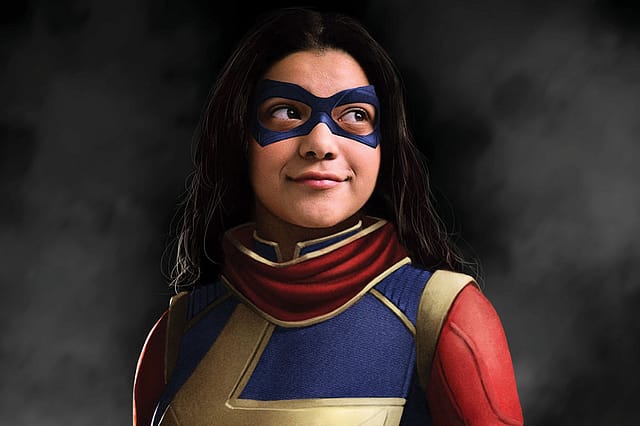Ms Marvel: The Brown Dollar

BROWN GIRLS FROM Jersey City don't save the world, says Kamala Khan, sitting on a ledge that looks out to the bright lights of New Jersey. Well, in the new Marvel universe of Disney where diversity and inclusion are buzzwords, a young Muslim woman is just what the box office ordered. According to Pew Research, by 2030, nearly three in 10 of the world's youth and young adults—29.1 per cent of people aged 15-29— are projected to be Muslims, up from 25.8 per cent in 2010 and 20 per cent in 1990. It's an investment worth making, especially given that by 2030, Pakistan is expected to surpass Indonesia as the country with the single largest Muslim population.
So, if Indians have Netflix's Never Have I Ever, Pakistanis can revel in their very own Marvel superheroine. In Kamala Khan, a goofy high schooler in Jersey City whose parents came from Karachi, Disney has found a supergirl every young Muslim woman can relate to. Not being allowed to go out for parties, being forced to go to the mosque for prayers in the segregated section with mottled carpets and dusty floors, and being considered weird for wearing the hijab.
Ms Marvel celebrates Muslim identity with the most colourful Eid community party I have seen on screen. But it also gently skewers it when necessary, as when Kamala's hijab-wearing friend, Nakia, runs for the mosque board election and runs into a wall of sexism. She also mutters in class about the mere minutes devoted to the history of the East because the history of the world is written by the oppressors. It looks at Partition from the Pakistani side, with Kamala's father explaining to his soon-to-be daughter-in-law how every family has a horror story from the Partition—of displacement, loss, and trauma.
Imran Khan: Pakistan’s Prisoner
27 Feb 2026 - Vol 04 | Issue 60
The descent and despair of Imran Khan
Ms Marvel also puts Bollywood, especially Shah Rukh Khan, on the world map as a global superstar, with Kamala being as big a fan of the Indian actor as the cute British Muslim boy who has just joined high school. They spend hours debating whether Baazigar is better than Dilwale Dulhania Le Jayenge (it is) and whether there is a bad SRK movie (there isn't). The music of the series is all-encompassing, playing 'Oh Nanba' from Rajinikanth's Lingaa to a hijab-wearing rapper from Karachi, Eva B's power anthem, 'Rozi'. Its words are like a political statement for marginalised young women everywhere: "Kabhi to main bhi nazuk si kali thi/Kabhi to main bhi baba ki pari thi/Raston pe dar dar ke chalti thi/dunijya joh kehti thi maanti main sahi thi (There was a time I was like a delicate flower/my father's little angel/I would walk the streets with fear/I would think what the world told me was correct)." The big question in Kamala's life is one faced by every Asian young person: who do you want to be in the world? As Kamala's mother asks: do you want to be good or do you want to be a cosmic head-in-the-clouds person? Kamala, who discovers her superpowers through her grandmother's bracelet, is able to turn her fantasy into reality, giving hope that it is possible to be different and yet be happy.
In Never Have I Ever, written by Mindy Kaling, Devi Vishwakumar is a young Indian high schooler whose biggest problems are that she's too bright and while her dermatologist mother is not trusting of the boys around her, she still allows her a modicum of freedom. Life is far more complex and complicated for Kamala. Indians are seeing themselves on streaming and in movies, the representation moving up from the stereotypical taxi driver to the doctor, techie, and CEO as diaspora Indians grow in income levels and clout in the US. Pakistanis are still largely represented as friends of the Taliban in series such as Homeland or as Uber drivers in Kumail Nanjiani's The Big Sick. That is if they are seen on screen at all. As Iman Vellani, the Pakistani-Canadian 19-year-old playing Kamala Khan, told a media outlet recently: "Growing up in Canada, I felt very disconnected from my identity as a Pakistani Muslim. I didn't have any Pakistani Muslim friends and never saw myself on screen, so I had buried that part of myself."
And how can you be what you can't see?
